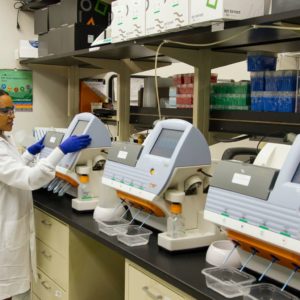Killing two-hundred cows for ONE burger: The dark hypocrisy behind ‘humane’ lab-grown meat and the Sydney University researchers offering a truly cruelty-free alternative
By 2050 there will be nine billion of us on this planet consuming 60% more food and almost twice as much protein as we do today, so where’s all this extra tucker coming from?
Well it’s not going to be grown in a lab, and if we really want to get the right proteins and essential omega’s it isn’t going to be with soy or pea proteins either say researchers at Sydney University who’ve discovered a new class of tasty and protein-rich plants that they believe will spark a ‘new era’ for sustainably-derived protein. The best bit – these proteins sources come as byproducts of agricultural waste and green energy programs!
For decades lab-grown meat, also known as cultured meat, has been the meat industry’s equivalent of the ‘flying car’; an impractical and expensive solution hailed as the inevitable future of all meat consumption.
Yet, despite the media perpetuating visions of ‘slaughter-free’ 12 oz steaks being grown in Petri dishes, the hypocritical truths behind lab-grown meat are widely unreported.
Lab-grown meat’s problems include extremely high production costs (we’re talking $7,600 [AUD] per burger), upscaling issues due to biological limits, and an alarmingly inefficient waste of animal life with dozens of cows slaughtered to produce just one lab-grown burger in Foetal Bovine Serum (details below).
But with world hunger on the rise for the first time in over a decade and the UN warning that a major food security crisis is set to hit within 30 years due to population growth and climate change, just where is our pragmatic plan to feed the world?
Industrial livestock farming simply won’t be able to meet demand due to the encroaching limitations on our natural resources including water and land, the UN reports, which will mean that by 2050 a large percentage of the population won’t have access to an ‘animal protein-rich diet’.
With all these critical factors in mind, researchers at Sydney University partnered with Defugo Technologies to develop Botanical Proteins, a range of versatile, accessible, and cost-effective plant proteins that deliver a full spectrum of proteins, as well as omega 3, 6 & 9.
The plant proteins have a nutritional profile that is similar to that of beef crossed with salmon, they’re easily digestible (bioavailable), and said to be ‘much tastier’ than the typical vegetarian sources of protein you may have tried, for example, chickpeas or soy as they are not over processed.
A spokesman for Botanical Protein said: “Botanical Protein is a technology platform – formed as part of the Defugo Technologies business – that provides cost-effective plant proteins all from the abundance of agricultural waste. Everyone assumes that cost is just a 3rd world problem, though we see cost, taste and health as very much everyone’s choice.
In response to where Botanical Proteins sits in the plant protein spectrum the spokes person said: “With the rise of the flexitarian consumer, plant proteins as an industry needs to step up in terms of how they are going to fit into the modern consumers balanced diet. It’s no longer good enough to be “novel” and as such at Botanical Proteins we are not trying to make plants taste like meat. Aside from the overuse of chemicals, salts and sugars to achieve these meat flavours, why would Botanical Proteins do that when plants have such amazing flavours already. With our products ranging from diary mimetics, proteins, omega’s and organic binders there is room for our ingredients in a broad array of any flexitarians diet, totally chemical and animal free!”
“These proteins are not intended to compete with existing protein or meat markets, but simply to provide an additional source of fast-growing, low-cost, protein to the world’s diet as we enter a food security crisis.
So why isn’t lab-grown meat the future of protein?
Despite sucking up millions of dollars in funding from private and public sources for decades, several inconvenient truths are halting the rollout of lab-grown meat.
In 2013 the first ‘ethical’ lab-grown burger was produced in a British lab from a tiny sample of cow stem cells taken from the living animal’s muscle under anaesthetic. Nothing too shocking.
However, what was not widely reported at the time is the fact that at least 200 cows were killed to produce the serum that ONE burger was grown in, Peta’s Science Consortium reports.
This is because once the stem cells were taken from the living cow they were placed into Foetal Bovine Serum (FBS), a serum produced from the blood of unborn calves who are slaughtered along with their mothers. This serum maintains the cells allowing them to proliferate (multiply) into strips of muscle as if they were still inside the body, and is used in this way for most lab-grown meats.
At least 100 pregnant cows and 100 unborn calves were killed to produce that ONE very bloody burger, and that’s a conservative estimate assuming all of the unborn calves were at full gestation when the most foetal blood can be drained.
One full-term unborn calf contains around a litre of blood, from that half a litre of FBS can be produced. Between 50 and 100 litres of FBS was used to grow that single ‘ethical’ hamburger, costing an estimated $380,000 (AUD), Peta reports.
But that was almost a decade ago, has the technology improved with the times? Not much. Around 50 litres of FBS are now used to produce one typical lab-grown burger, Mark Post, a co-founder of Mosa Meat, previously told Wired (Mosa Meat announced it had gone FBS free in January).
Today there are around 70 startups and 40 larger companies worldwide that claim to be ‘pioneering’ cultured meat, according to the Good Food Institute.
Of those, most continue to rely on the use of Foetal Bovine Serum as a growth medium protein for their ‘vegan-friendly’ meat cells as it is compatible with a wide variety of other animal cells.
Each year around 1,000,000 bovine foetuses are harvested so their blood can be drained and used as FBS, this could be closer to 2,000,000 according to some sources as demand increases.
The serum can’t be reused at present as ‘metabolites’ from the muscle cells are released into the medium as they grow. Aside from the animal welfare issues, FBS can also be infected with viruses, bacteria, and fungi.
The majority of this FBS is produced in the USA (26%), followed by Brazil (23%), and Australia (15%), according to figures from Serumindustry.org. All of these producers claim that the pregnancies they harvest are ‘accidental’ as a result of keeping dairy cows pregnant for milk production, Peta reports.
Not only does using FBS make lab-meat’s claims of being ‘humane’ baseless, but also deems their products commercially non-viable, with prices of bovine serum having increased by 300% over the last two years to around $1,200 (AUD) per litre.
The estimated cost to produce one lab-grown burger is now at around $7,600 (AUD), WIRED reports. Meanwhile, in comparison, Botanical Protein is able to harvest ethical 100% plant proteins and other plant derived extractions, with high bioavailability every 90 days. As this is all from agricultural waste the costs per unit are measured in cents, not dollars.
But if a sustainable alternative for FBS was widely adopted by the industry, could lab cultivated meat solve the world’s protein problems? No, probably not, according to an analysis from the Good Food Institute.
Around 4,000 superlab facilities (costing $601M [AUD] each) with giant specially designed bioreactors would need to be built by 2030 to produce just 10% of the world’s protein needs using lab-grown meat, Food Navigator reports. This would cost $2.4 trillion AUD.
Another two-year techno-economic analysis on the viability of food scale cultured meat production commissioned by Open Philanthropy and conducted by Dr David Humbird, a UC Berkeley trained chemical engineer with 20 years of experience in process industries, found “a number of significant barriers to the scale-up of animal cell culture”.
Dr Humbird told The Counter, that it was “hard to find an angle that wasn’t a ludicrous dead end” when researching the possibility of food scale lab-grown meats.
That’s not to say that there isn’t a small commercial market for novelty lab-grown meat in the developed world, as proven by 1880 in Singapore – the first restaurant to offer customers a taste of lab-grown chicken bites from December 2020, at $32 (AUD) per plate.
But with a trillion-dollar investment needed just to build a fraction of the labs required, the consumer would likely end up footing the bill, meaning that cultured meat won’t be the affordable protein source the world needs, researchers at Defugo Technologies claim.
Will Botanical Proteins solve the world’s protein problems?
Yes, they could, according to researchers at Sydney University. The protein-rich plant varieties that fall into the newly created Botanical Protein class are fast-growing, easily upscalable, and readily available as a ‘waste’ byproduct of current agriculture and green energy processes.
Botanical Proteins can be grown in almost any climate and unlike lab-grown meat they don’t require hundreds of thousands of million-dollar superlabs to be built.
This ensures the cost of the protein is low for the consumer, making it a far more viable solution to ending food poverty across the globe rather than a solution designed for the convenience of the most privileged.
Botanical Protein was designed as a practical solution to a problem that is ongoing, as the food security crisis has already begun for the world’s most vulnerable communities. To put it in perspective, tragically, whilst approximately 4.7 million people died of Covid-19 worldwide during the pandemic, 16 million people died of hunger in the same period – protein scarcity plays a large part in that.
Additionally, no high-tech chemical processing facility or other ingredients (such as sugar or salt) are needed to make Botanical Proteins palatable, unlike other plant-based alternatives that mimic meat and use binders such as KY Jelly, yep same one you are thinking of, let that sink for awhile.
Another benefit of Botanical Proteins is their ability to mitigate the effects of climate change in traditional cattle farming as there is a range of products, again made from a waste stream that has a very high load of protein, up to 35%. When mixed with a range of other ingredinets it is estimated that this animal feed will not only reduce cattle burps by up to 80%, it will also make for healthier, heavier animals that will reduce the need for some many beasts per acers of land. With cattle burps being estimated at creating a whopping 14.5% of humanity’s greenhouse gas emissions each year, according to the Food and Agriculture Organisation of the UN, reducing them by 80% at scale will be a huge benefit to graziers and consumers alike.
Botanical Proteins will also benefit the carbon-negative status of graziers and farmers that choose to farm these plants as they sequesters carbon into the soil as the crop grows, removing climate-changing greenhouse gases from the earth’s atmosphere at a rate of around 15-20 metric tons an acre. To put that into perspective, Australian Carbon estimates that it would only take the conversion of 4.25% of vacant Crown Land, that’s land the Government owns and is doing nothing with, for Australia to become Carbon Neutral. Every acer thereafter is a Carbon Negative and healthier Australia!
Botanical Protein added: “Not only will our low-cost, fast-growing, and accessible protein-rich crops help to end protein scarcity across vulnerable populations, Botanical Proteins will also go some way to reversing climate change rather than perpetuating it, which with a traditional approach to proteins and calories in the race to feed 9 billion people isn’t a given result.”
“Unfortunately it is just a matter of time until the global population will be forced to change their diet to accommodate environmental and economic factors facing the world today. Botanical Proteins aims to serve humanity by filling the nutritional void that will be left by the escalating price of meat, the dislocation of calorie distribution and the short comings of other plant protein products. This was highlighted recently in Indonesia where a large majority of the population slipped back into poverty due to the rising price of soy.”
Details of the specific plants in development are being kept under wraps by Botanical Protein, who say they are happy to disclose information to those who get in contact directly.
With products like healthier organic meat binder alternatives, Botanical Proteins is already improving the health rating of traditional and alternative meat nuggets, paddies and fish finger type products by increasing the fibre content and lowing the GI reactions in these foods.
They’ve also worked out how to cheaply flavour alternative proteins, dairy free products, lab meats and other plant-based products with plant derived triglycerides (the fatty acids that give food its taste). Extracted from any oil plant waste material such as canola, hemp, kenaf, palm oil and sunflower, by using a low tech, room-temperature extraction process that doesn’t require expensive bioreactors and as such is more accessible to processors in developing countries. This plant derived triglycerides will change how consumers “feel” about plant proteins, as its all about that burst of flavour and weight on your palate that makes triglycerides so very yummy to us humans.
Botanical Protein will offer all the benefits promised by lab-grown meat, such as freeing up millions of acres of farmland from livestock, preventing habitat and biodiversity loss due to land clearing, and taking the pressure off endangered species such as Tuna due to overfishing.
If you’re willing to accept a meal grown from animal cells in a lab, surely switching to a source of sustainably-derived protein from a humble plant isn’t too much to ask?
**ENDS**
Sources:
https://ganino.com/science/alternatives_fetal_bovine_serum_industrialization_lab_meat
https://keystonedialogues.earth/wp-content/uploads/2015/07/Brief2-Marine-protein.pdf
https://www.bbc.com/future/bespoke/follow-the-food/five-ways-we-can-feed-the-world-in-2050.html
https://www.youtube.com/watch?v=2o0MCZwL_VE&ab_channel=euronews
https://www.youtube.com/watch?v=b5wvei1TJig&ab_channel=TheTimesandTheSundayTimes
https://thecounter.org/lab-grown-cultivated-meat-cost-at-scale/
https://www.youtube.com/watch?v=IH1a1wOdCfk&ab_channel=TheGoodFoodInstitute






